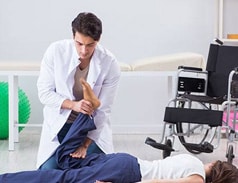Are you Experiencing Lower Back Pain?
We see a lot of people with acute lower back pain and a lot of the time it is to do with spinal disc injuries. Most people have heard about a slipped disc or a disc bulge. Technically a spinal disc can’t slip or go anywhere because it is firmly attached to the vertebral bones. A disc is made up of fibrotic material that is also orientated around like a ring, as well as being vertical and diagonal. Inside the fibrotic outer ring which is called the annulus fibrosus, there is a softer centre called the nucleus pulposus. Disc degenerate due to age, overloading and degenerative disc disease. The central soft section becomes firmer as it can’t cope with the loads the fibrotic ring takes for of the loads and starts to fall under pressure then tears develop, which we called fissures in the outer ring and this can then cause a bulge, the bulge can cause pain itself, but the outer fibres remain intact and so normally resolves with physiotherapy treatment conservatively.
If the outer fibres of the annulus fibrosus tear then the softer centre, the nucleus pulposus can squeeze out and this is called a disc herniation. The disc material can physically compress the exiting nerves that come out between the spinal levels or the chemical substances that leak out from the soft centre can cause inflammation. Both will result in serve local pain and spasm and is also the possibility of referred pain following the nerve pathway. 95% of disc herniations occur in the lower back in what we call the lumbar region with most of them occurring at L4-L5 or L5-S1. The herniation is mostly posterior lateral which is where the fibrotic ring is at its thinnest and it’s not supported by the anterior longitudinal ligament which is at the front part of the disk. People suffering from a lumbar disc herniation or bulge will often report localised severe back pain into the lower back and glute (buttock) region and mostly to one side. Sometimes if the nerve is irritated the pain with also be felt down the leg in that side and the person would also have difficulty standing straight and bending forward would be painful and restrictive.
The good news is that physiotherapy can help I both the acute phase to settle your pain and gain your back movement and also in the long term. The correct exercise program can reduce your rate of re-occurrence from 80% down to below 20%. So if you know someone who might have a disc injury and you think this information might help them out, let them know and share this with your friends. If you think you have a disc injury and you would like to see if we can help, give us a call or come to see us at Miami or Lakelands Physiotherapy.

